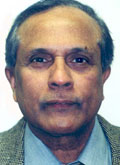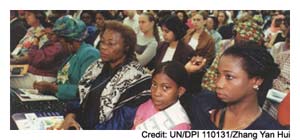 UN May Postpone Creation of New Women's Body
UN May Postpone Creation of New Women's Body
By Thalif Deen
UNITED NATIONS, Sep 5 (IPS) - A coalition of over 300 international non-governmental organisations (NGOs) is "outraged" that an impending decision to create a new women's entity at the United Nations is being postponed once again.
"If the General Assembly fails to act, it will send a very negative signal to women around the world who are now beginning to engage in national and regional reviews of the 1995 Bejing Platform for Action for Women," says Charlotte Bunch, executive director of the Centre for Women's Global Leadership at Rutgers University.
The proposal to set up a new gender entity, to be headed by an under-secretary-general, was expected to be approved by the 192-member General Assembly before it concludes its current sessions on Sep. 14.
But the longstanding proposal is now expected to be passed onto the next session of the General Assembly beginning Sep.15 through September 2010.
"NGOs are outraged that this would continue to be postponed," Bunch told IPS. "No further delay is justified when no government has said they are opposed to taking this step."
The international coalition is pursuing a global campaign for Gender Equality Architecture Reform (GEAR) in the U.N. system.
The coalition includes Women's Environment and Development Organisation (WEDO), Center for Women's Global Leadership, International Planned Parenthood Association, Asia Pacific Women's Watch, African Women's Development and Communication Network and Development Alternatives with Women for a New Era, among others.
As part of its campaign, the coalition has been calling for the consolidation of four existing women's U.N. entities into a single body: the U.N. Development Fund for Women (UNIFEM); the Office of the Special Adviser on Gender Issues; the U.N. Division for the Advancement of Women; and the International Research and Training Institute for the Advancement of Women (INSTRAW).
As a result, Secretary-General Ban Ki-moon admits the "U.N. gender architecture lacks a recognised driver"- and is probably in danger of heading in different directions. "It is fragmented. It is inadequately funded, and insufficiently focused on country-driven demands," he complained last year.
Stephen Lewis, a co-director of AIDS-Free World and one of the strongest advocates of the gender proposal, told IPS: "I have been following this story with much intensity over the last 48 hours, and I myself have spoken to several ambassadors (both from the South and the North), to impress upon them the fact that under no circumstances can this resolution be postponed".
He said that it would be "a terrible slap in the face to the women of the world, a dreadful rejection of the views of the secretary-general, and a deep blow to the credibility of the United Nations."
As things now stand, the consensus that had emerged is being sabotaged by a consortium of countries, belligerently disruptive and destructive, led by Cuba, Sudan, Iran and Egypt, he said.
The nation states of the U.N. overwhelmingly want to approve the creation of the women's agency by resolution on Sep. 14, and begin the process of a global search for an under-secretary-general, "but this little group of malcontents is holding the world to ransom".
"They're using women as a bargaining chip in the effort to exact concessions on governance and finance, the other prongs of the System-Wide Coherence process. They care not one whit for the rights and needs of the women of the world," Lewis charged.
The co-chairs of the 'UN System-Wide Coherence' process overseeing wider changes in the world body - Ambassadors Juan Antonio Yez-Barnuevo of Spain and Kaire M. Mbuende of Namibia - have already recommended "that the General Assembly take action during the current session and decide on the establishment of a composite [women's] entity."
But its recommendation has apparently been ignored by some member states which are pushing for the postponement.
In an appeal to member states Friday, the London-based Amnesty International, which is part of the coalition, said it strongly supports "the creation of the new U.N. women's organisation which we believe could better protect women's human rights".
"But we have just heard that some U.N. member states are 'holding hostage' the creation of this new women's organisation in exchange for other, unrelated, U.N. reforms that also need to be agreed by the General Assembly".
And some other states which are in favour are keeping silent, AI said.
"AI and other women's human rights defenders are outraged that the creation of this important U.N. women's organization is part of political horse-trading," the group said.
"We appeal to your government to instruct your diplomatic missions at the U.N. in New York to champion the establishment next week of a new strong U.N. organisation for women".
Bunch told IPS that this decision has been pending since consultations in June "when we were assured that virtually all governments were ready to move on it - and that the resolution would as usual come at the very end of the current General Assembly session on Sep. 14."
Asked where Secretary-General Ban Ki-moon stands on this issue, she said: "The secretary-general has repeatedly said that he supports this move." But she said that Ban "needs to put some pressure on governments".
"The only government that we know for sure has said it should be delayed is Egypt," she said, but pointed out that none of the others will openly say they oppose it.
"But it's gotten bogged down as part of the System-Wide Coherence Process (which is part of a wider reform of the U.N. system)", she added.
Lewis told IPS, "What we have here is a direct challenge to the authority and influence of the secretary-general and the deputy secretary-general (Asha-Rose Migiro)."
Their reputations are directly on the line. A defeat for the resolution would mean a defeat for the leadership of the United Nations, he pointed out.
"It can't be allowed to happen. We know that the secretary general and his deputy are working round the clock to rally the majority of the General Assembly against this dismal little group of pariah states."
"They must not fail. If worse comes to worst, the resolution should be put to a vote, and passed by an overwhelming margin," said Lewis, a former deputy executive director of the U.N. children's agency UNICEF.
